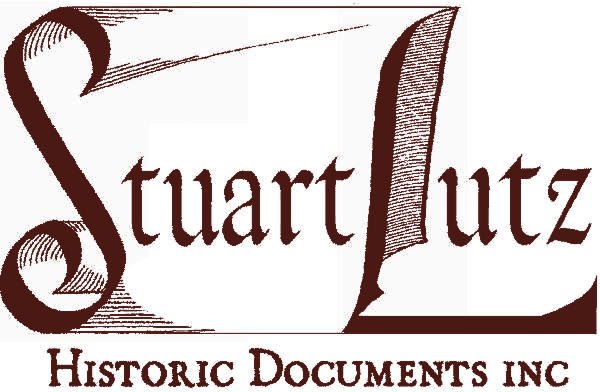| |
 (BOWLING) (BOWLING) |
|
|
|
|
| |
Price: $300.00 |
Stock# 5389 |
| |
AMERICAN DIPLOMAT THOMAS ASPINWALL IS INVITED TO A BOWLING DEMONSTRATION IN LONDON
(BOWLING). Document. 1pg. May 1, 1849. 383 Strande, [London]. A handwritten invitation from the Proprietors of the American Bowling Saloon to American consul in London Thomas Aspinwall (1786-1876) to attend a bowling demonstration: “The Proprietors of the American Bowling Saloon beg the honor of the company of Colonel Aspinwall to an opening entertainment on Thursday next may 3d at 8 O’clock P.M., on which occasion they propose to give a private view of the very exhilarating & devoutly esteemed American game of Bowling as practiced in the United States. (Supper at the table at 9 oclock).” Bowling has been practiced since antiquity, in England since the Middle Ages, and in America since the colonial period (think of the reference to the sport in Rip Van Winkle). This reference to specifically American bowling must have to do with variations to the game. It is in fine condition. |
5389
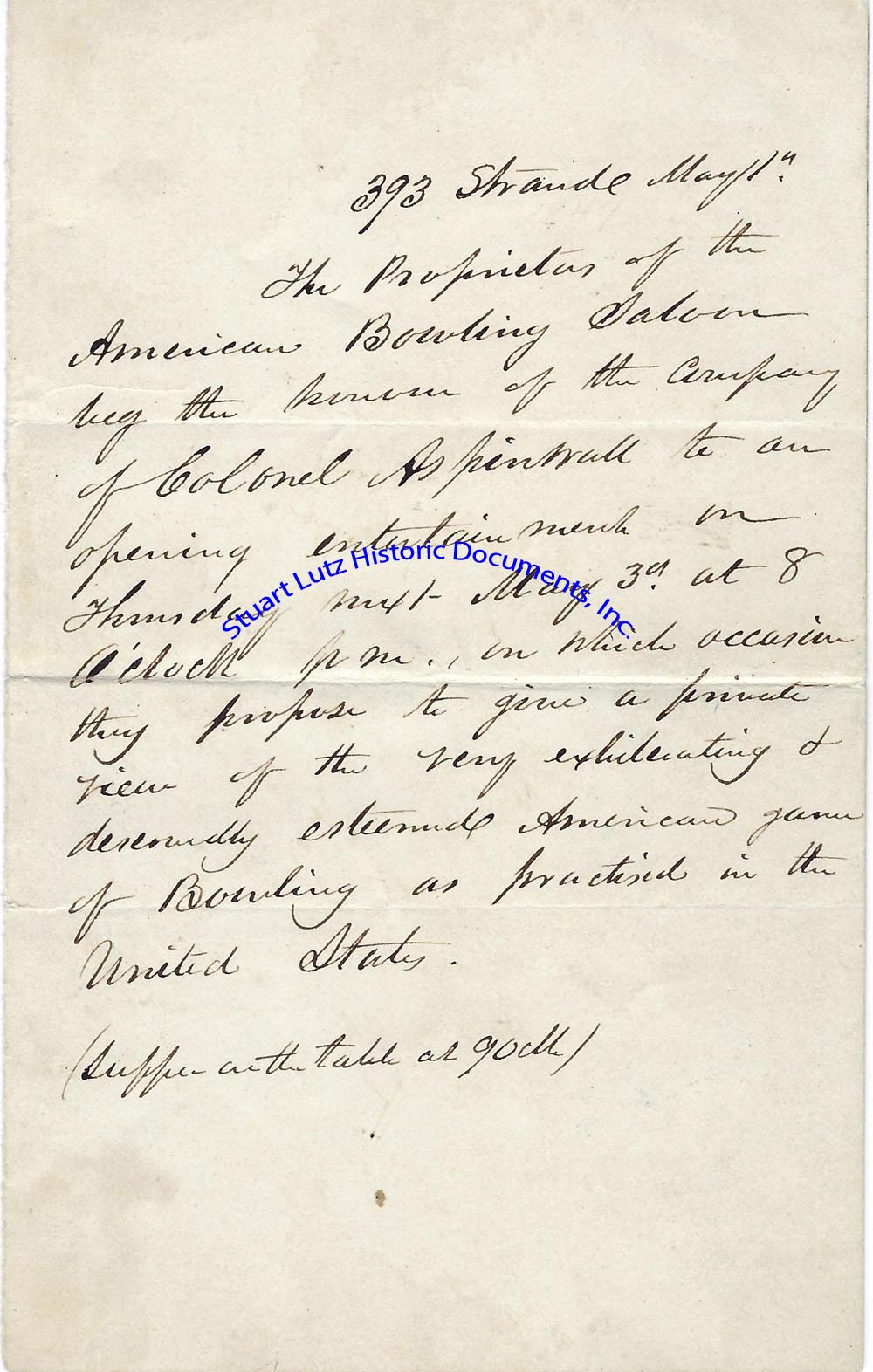
|
|
| |
| |
 (CHINESE LEADERS) (CHINESE LEADERS) |
|
|
|
|
| |
Price: $3,000.00 |
Stock# 6202 |
| |
PROGRAM FROM CHINA WORLD TRADE CENTER RIBBON-CUTTING CONTAINS RARE SIGNATURES BY “EIGHT IMMORTAL” WAN LI AND 4TH PREMIER LI PENG
WAN LI (1916-2015). Wan served as 4th Vice Premier of the State Council (1893-1988) and 5th Chairman of the Standing Committee of the National People’s Congress (1988-1993). He was one of the "Eight Immortals" of the Chinese Communist Party, elders with revolutionary experience who were called upon to make decisions after Deng Xiaoping became leader in 1978.
LI PENG (1928-2019). Li served as 4th Premier of China (1988-1998), during which he acquired the name “Butcher of Beijing” for his hardline stance during the Tiananmen Square Massacre.
DS. 4 pgs. 6”x 8 ¼”. August 30, 1990. Beijing, China. A document signed by Li Peng and Wan Li. They both signed in Chinese characters on the front cover of the program titled “Welcome to the Grand Opening of the China World Trade Center August 30, 1990”. The inner leaf of the programs details the programs, including performers and speakers, and the “Ribbon Cutting” by Li and Wan. The China World Trade Center began construction in 1985 but was not completed until 2010. It is the largest building complex in Beijing, consisting of hotels, shopping malls, offices, apartments, convention rooms, and an exhibition hall. Signatures by both individuals are quite scarce, and to have them together is even rarer. The program is on heavy stock paper and in very fine condition. |
6202
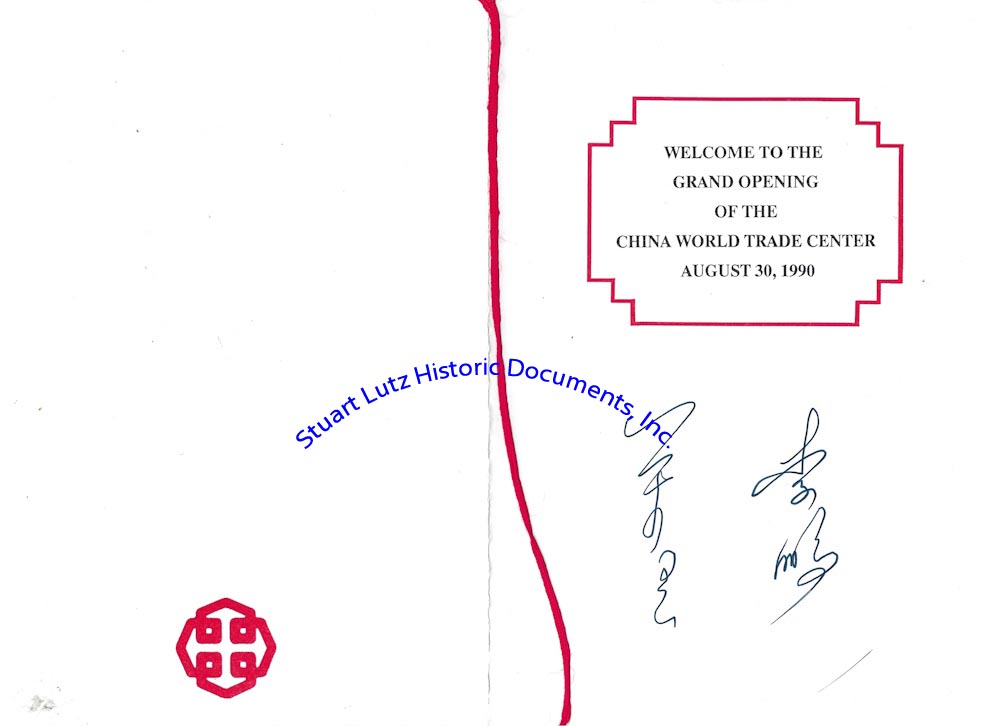
|
|
| |
| |
 (CHINESE REVOLUTION) (CHINESE REVOLUTION) |
|
|
|
|
| |
Price: $1,000.00 |
Stock# 5725 |
| |
THREE LETTERS WRITTEN TO AN AMERICAN WOMAN FROM CHINA DURING THE COMMUNIST REVOLUTION – “PEACE MOVEMENT IS NOT LIKELY TO BE SUCCESSFUL. WAR IS GOING ON. MANY PEOPLE HAVE BEEN KILLED IN BATTLE-FIELDS BY WAR, EVEN MORE PEOPLE DIED BECAUSE LACK OF FOOD AND CLOTH. SEVERAL DAYS AGO, IT IS SAID, MORE THAN 1,000 PEOPLE HAVE DIED IN THE STREETS IN SHANGHAI DUE TO THE COLD WEATHER.”
(CHINA). Archive. Three pieces. January 7, [no year] (2pgs); February 27, 1948 (1pg); November 30, 1948 (1pg). [Shanghai], China. A trio of letters written and signed in English to an American named Mary Watson. They were written by at least two different people in China during the Chinese Communist Revolution. All three concern the violence, suffering, and uncertainty that prevailed in China at the time. One letter states: “…Many times I decided to write to you, but I did not know to write a letter in such drastically changeable times. I wished to report some good news to you, but failed so many times. Peace movement is not likely to be successful. War is going on. Many people have been killed in battle-fields by war, even more people died because lack of food and cloth. Several days ago, it is said, more than 1,000 people have died in the streets in Shanghai due to the cold weather. Price index jumped three times in ten days. How the poor can stand? So the common people in every part of this country are praying for peace, despite what the terms between the fighting parties. They do not care this ‘ism’ or that ‘ism’, want only a bare living…”. One of the writers was an economist, possibly working for the United Nations: “…I’ll not give up my research program. Please drop a card to Blakiston Book Co., Philadelphia while the Readings in International Trade and Readings in the Theory of Price are being published, please mail one copy for each to you. I should like to trouble you sending them to me. Please let us me know if there is any new book useful to me. There is only one thing for us to do – research…Pai-Kang Chiang will be leaving for the Philippines tomorrow, representing the Economic Commission to FAO’s Rice meeting. I didn’t have chance to see Chang-Yi often. I met him at a dinner party given by the Harvard Club last week but didn’t have time to have a long talk with him. However, he looked quite fit…”. The third letter, which was written by someone else, reports that the sender and his family planned on moving to Hong Kong in search of greater security and better healthcare: “…One conclusion may be drawn from my observation is that not at all bright (speaking moderately). My wife is expecting to give birth before end of January. I’m not sure whether she can get adequate medical care by staying here. Furthermore the change is going to take place soon & when it comes certain unlucky people will be sacrificed during the interim period. I don’t want to be one of them. For these two reasons we have decided to move on to Hong Kong. I hope & pray to get a job there…”. The letters are in very good condition with assorted toning, tears, and a seal that shows through from the other side of one letter. A fine collection of letters from an important time in world history. |
5725
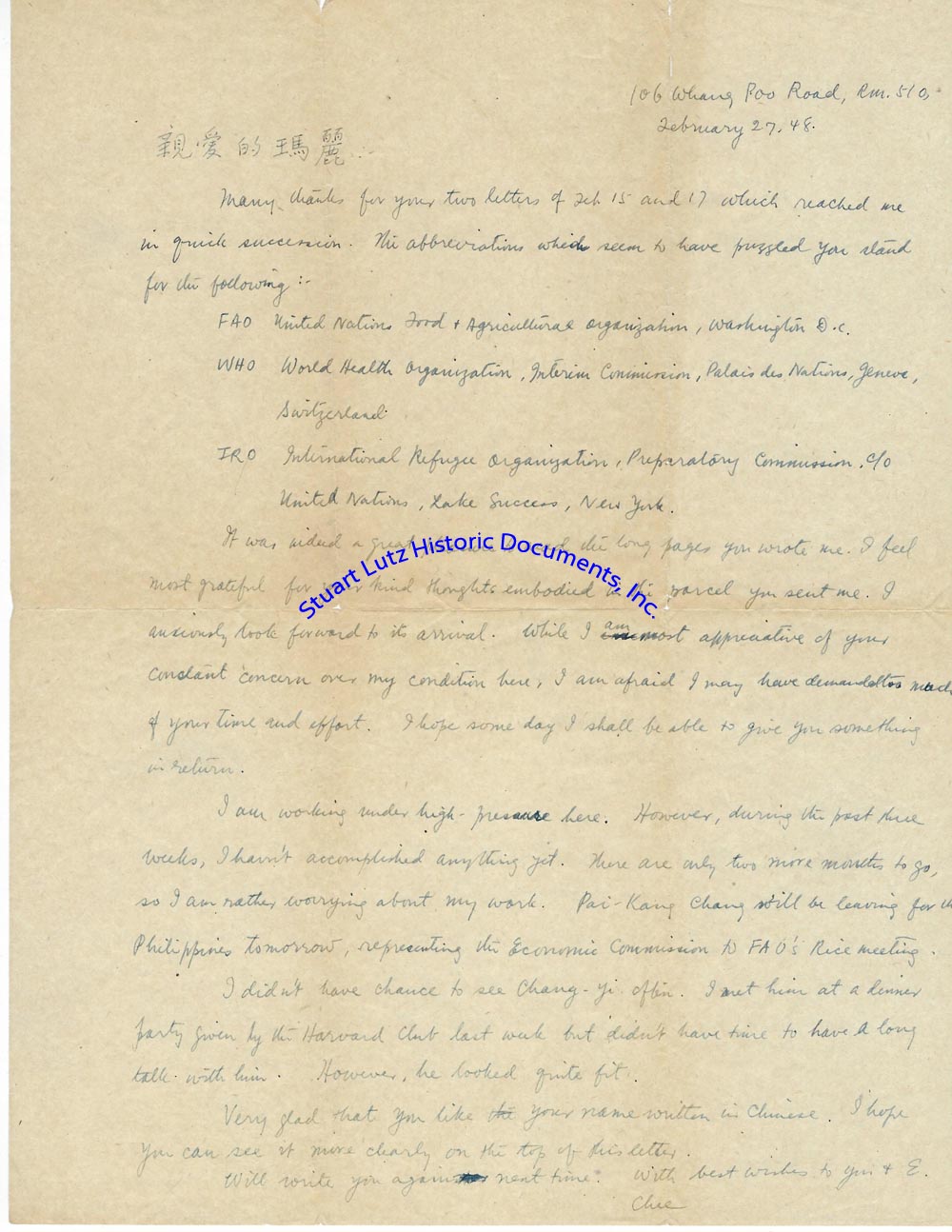
|
|
| |
| |
 (DUC DE LAUZUN) (DUC DE LAUZUN) |
|
|
|
|
| |
Price: $1,000.00 |
Stock# 6003 |
| |
THE DUKE OF LAUZUN, IN NEWPORT AND AWAITING A MARCH TO YORKTOWN, PROMISES A “RECOUNTING OF THE BATTLE OF 16TH MARCH”, THE BATTLE OF CAPE HENRY OFF OF VIRGINIA
ARMAND LOUIS DE GONTAUT, THE DUKE DE LAUZUN (1747-1793). Gontaut was a French soldier who fought in the American Revolution. He helped the French army at Yorktown, marching his troops from New England to Virginia. he was guillotined during the Reign of Terror.
ALS. 1pg. 7” x 9”. March 27, 1781. Newport [Rhode Island]. An autograph letter signed “Le Duc de Lauzun” in French to an unidentified correspondent: “Newport 27th March 1781 I ask your forgiveness, sir, for all the trouble and confusion caused you by my business affairs. I am writing in strong terms to M. Marchand and M. de Guéménée. I ask that my tableware be returned to Frantz; I beg you to sell it and to dispose of the money. If you find yourself in difficulties, either from paying the nine thousand francs, which I drew upon you in January, payable on sight within six months, or from any other causes, send to M. Pays to share this burden with you and assist you with the resources that can be found in the remainder of my little fortune. If, by the next post, which we await daily, I don’t learn that all has been restored to order, I will send you a general proxy. I enclose here a life certificate and a recounting of the battle of 16th March. Be assured, sir, of my complete and sincere affection for you. The Duke de Lauzun”. The combat of March 16th mentioned was the Battle of Cape Henry off the Virginia coast in which a British squadron met the French fleet; the result was a draw. Lauzun's biographer identifies M. Marchand as the duke's steward, and M. Pays as the keeper of his accounts. The letter has a vertical and horizontal fold and the usual light soiling. |
6003
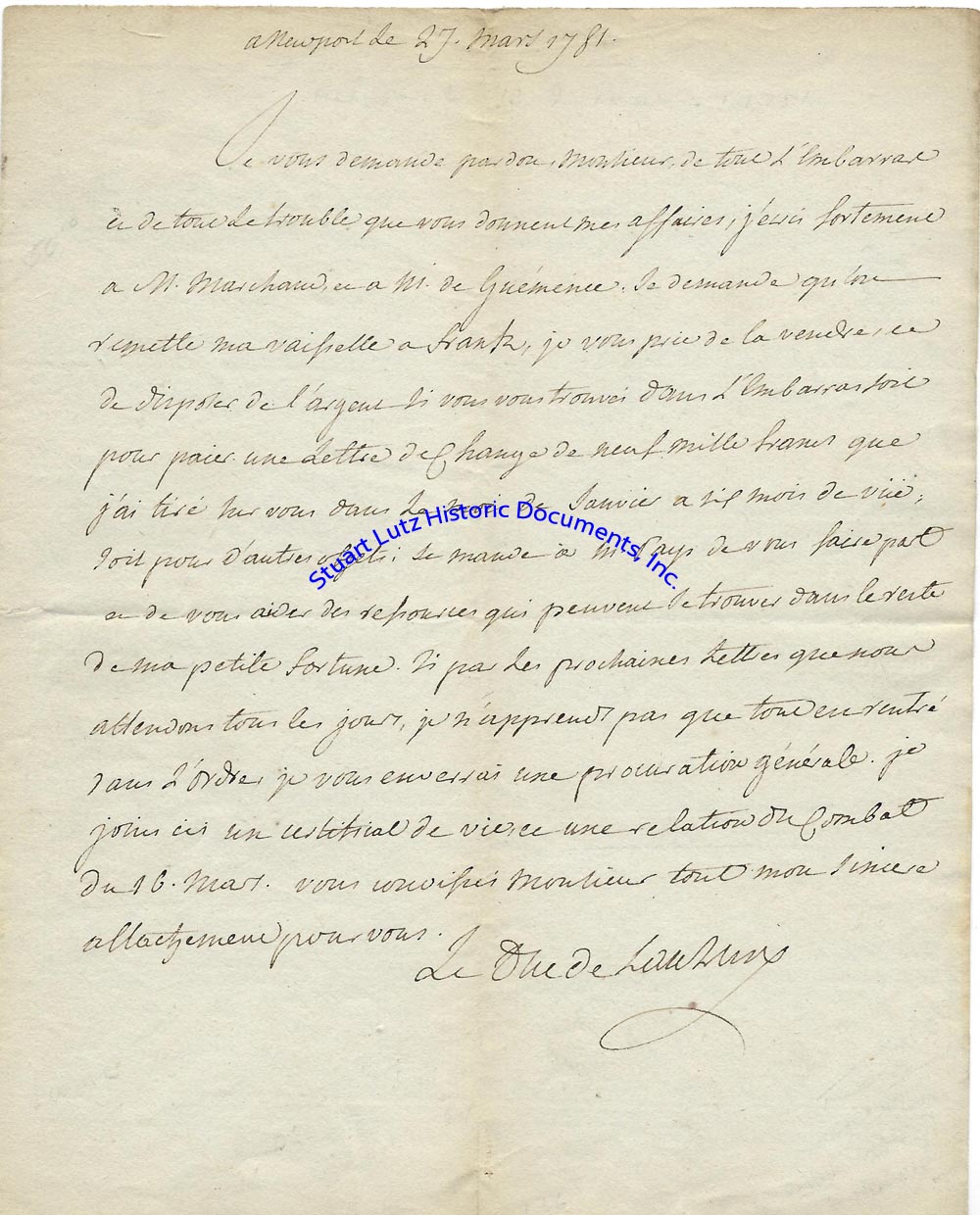
|
|
| |
| |
 (DUKE OF WELLINGTON) (DUKE OF WELLINGTON) |
|
|
|
|
| |
Price: $400.00 |
Stock# 6165 |
| |
LETTER WRITTEN BY FRENCH DESERTER TO THE DUKE OF WELLINGTON DURING THE NAPOLEONIC WARS
ARTHUR WELLESLEY, 1ST DUKE OF WELLINGTON (1769-1852). Wellesley was one of the leading British military and political figures of 19th-century Britain, serving twice as prime minister of the United Kingdom from 1828 to 1830 and in 1834, and as Commander-in-Chief of the British Army from 1827 to 1828 and 1842 to 1852.
ALS. 2pg. 8” x 13”. November 15, 1813. Lymington. An autograph letter signed “Dovalle” addressed “To His Excellency the Marquess of Wellington, Captain General of the Army of Spain”: “My Lord, Having had the honor of presenting myself at your headquarters at Villa Toro the 4th October 1812, having deserted from Burgos on 15th July of the same year, you had the kindness to promise that I would be paid wages from 4th October until the moment of my boarding ship (24th March 1813). Having received nothing of these arrears but 3 doros, one pair of trousers, one shirt, and one pair of shoes from Mr. De Beker, the Lieutenant command of the depot of deserters at Lisbon, I have the honor to request that you kindly order payment of the wages that it is my right to demand, as Mr. Tiole, in the same situation as myself, has just received his by your orders. I dare to trust in your kindness, my Lord, that you will consider my request and grant it a favorable reception”. The Peninsular War was fought from 1807 to 1814 and between Napoleonic France and Great Britain, Portugal, and Spain. Spain had been an ally of Napoleon until he forced the abdication of the Spanish monarchy in favor of his brother, Joseph. British forces, under the Marquess of Wellington, gained control over Portugal and launched a campaign to liberate France. They attempted to take the city of Burgos in 1812, whose proximity to France made its fall in 1808 the first sign that Napoleon was going to capture France, but failed. A successful French counterattack forced British and Portuguese forces back to Lisbon, taking many prisoners, including French Lieutenant Dovalle, though according to this letter he was a deserter. However, rather than focus on Portugal, Napoleon launched his ill-fated invasion of Russia. This allowed the Marquess to regroup, and the Coalition scored a victory over King Joseph Bonaparte's army at the Battle of Vitoria, paving the victory of the war in the Iberian Peninsula. By this time, Dovalle had been evacuated to Lymington, a thriving port city in England’s southeast. No record exists if he was ever granted his back-pay. Thanks to his victory during the Peninsular Campaign, Wellesley received his more well-known title, Duke of Wellington, on May 3rd, 1814, before assuming command of the Seventh Coalition forces and ultimately defeating Napoleon at Waterloo the following year. The letter is in French, but a typed transcription is provided. The letter is in fine condition, with some minor folds. |
6165
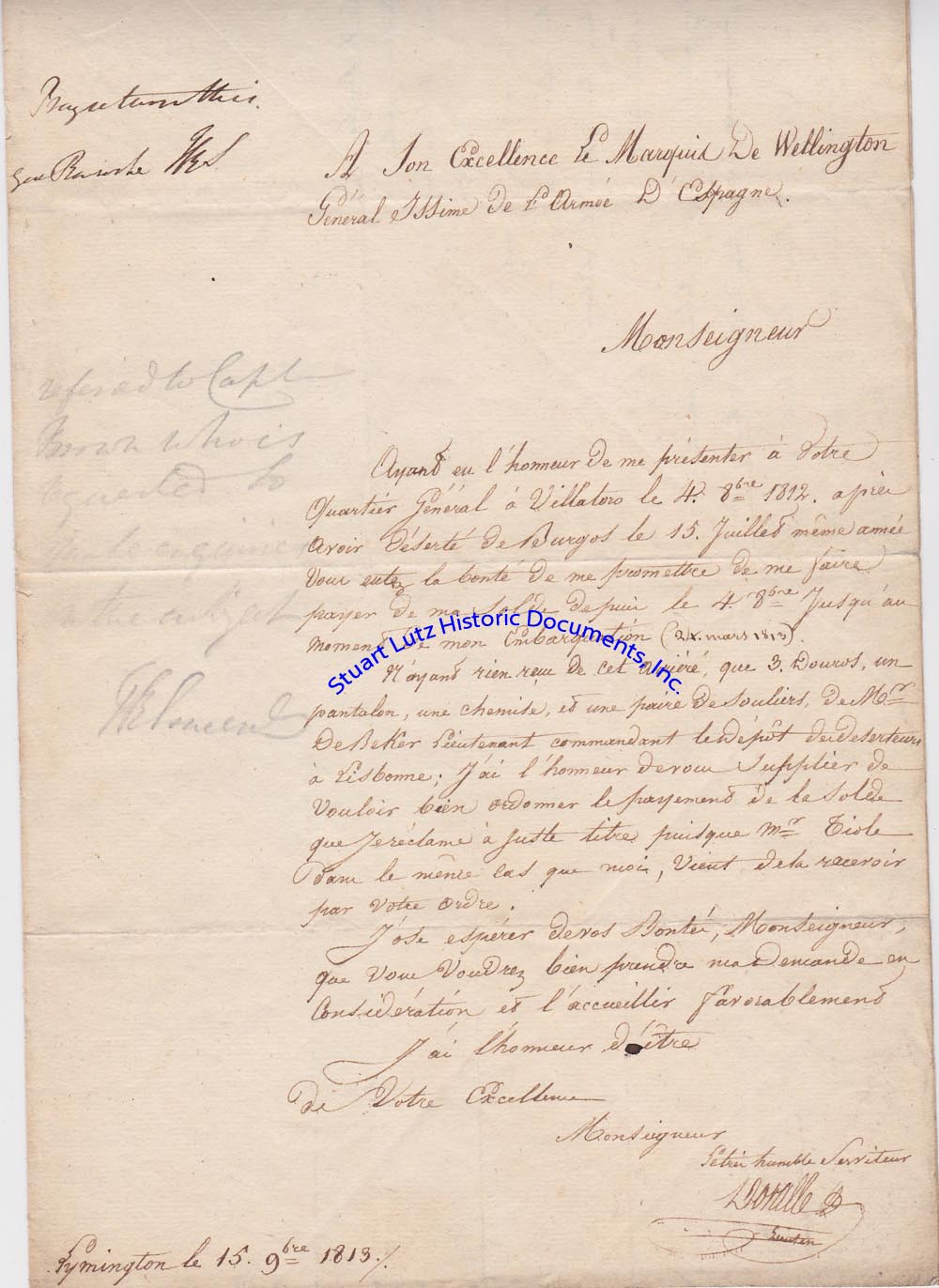
|
|
| |
| |
 (EARLY RUSSIA ARCHIVE) (EARLY RUSSIA ARCHIVE) |
|
|
|
|
| |
Price: $950.00 |
Stock# 4678 |
| |
NINE LETTERS TO JOSEPH SLOCUM, A NEW YORK MERCHANT WHO TRIED TO SELL FARM EQUIPMENT TO RUSSIA IN THE MID-NINETEENTH CENTURY
JOSEPH SLOCUM (1800-1853). Slocum was a merchant from Syracuse, New York who attempted to sell farm equipment to Russia in the nineteenth century. He was unable to turn a profit from his endeavors, and his family fell into financial hardship. His daughter, Margaret Olivia Scolum Sage, became an influential philanthropist and teacher. She endowed a building and a now-defunct agricultural school at Syracuse University, both named after him.
Archive. 9 pieces. 1830s-40s. An archive related to Joseph Slocum and his business with Russian agriculture. There are nine letters and documents, predominately letters written to Slocum from various Americans and Russians. Highlights are listed below, and the best piece is the first one, the lengthy manuscript detailing Russian agriculture and natural resources:
- Handwritten document. 4pgs. September 12, 1846. St. Petersburg, Russia. The four page handwritten manuscript is entitled “Some Rough Hints About the Productive Power of Russian Agriculture”. It states in part: “European Russia it may be divided, grosso muto, in three great regions or belts, running from East to West. 1st - The first region extends between the White Sea and the provinces of Tver, Smolensk, Nijni-Novogorod & Kazan - it contains more wood, low, marshy ground, intermixed the sand, Baron then arable land. – Rye, oats, barley, potatoes, hemp and flax are the main products of that region. 2nd - the second section of the Empire, being comparatively densely populated, forms a central part of the European Russia – it is particularly addicted to manufacturing pursuits. It's Southern limits is about the course of the Oka River & the Central Valley of the Volga. The agricultural products are nearly the same as aforesaid. 3rd - the third region, extending to the south and southeast as far as the Black Sea, the provinces of Ashnaklan and the Ural Mountains, reaches the Carpathian mountains, Galicia, & Moldavia in the West. It is mostly covered with a rich strata of black earth with a subsoil of clay, lime & sandstone. Minoru is generally not used in this part of the country, vulgarly called the step, or prairie count the staple products of the fertile district are rye, winter and summer wheat ( especially summer wheat - the summer frosts in the autumn preventing the seeds of the winter week to start up well), millet, oats, barley, peas, buckwheat, field poppy, hemp, flax & linseed... Cotton & Vine are raised merely in the most remote districts of the South, such as Georgia, Astrakhan, the territory of the Cossacks of the Don, Crimea & Bessarabia. Three other very important staples of Steph region are livestock, & saltworks & fisheries. The stock consists mainly of horned cattle, and horses grazing in large herds on the pastorate of the steps of the Black Sea… As well as on both sides a lower Volga. Sheep, both Merinos, Saxon & form and main object of the agricultural industry of the step and owners. – The Russian or common sheep is generally the property of the peasantry. The wool and tallow are usually sent overland in the winter to the manufacturing districts of the central belt of Russia (Moscow...) Or exported via Odessa, Taganrog, Riga & Petersburg to England and France. The saltworks are especially remarkable on the left sure the Volga, on the verge of the province of Astrakhan, as well as near the Ural River, not far from the city of Orenburg. The Lake Elton alone, of a circumference of nearly 180 miles, is a solid mass of salt inexhaustible in its mineral riches. The stone saltworks of Gletznaia...As well as the saltworks a Crimea, produce an immense quantity of that precious mineral. Besides that all the basin of the Caspian is full of an infinity of small salt lakes. The main fisheries are at the mouth of the Volga, on the Caspian – they produce an enormous quantity of fish of all kind. Besides that of the fisheries of the Ural River on the Don... The main fluvial artery of Russia is the Volga – it is a Mississippi of our country. Its length is upwards 3000 miles. Unfortunately, it is frozen up during nearly 6 months of the year. There are but very few steamboats in it. This year a large steam tow boat has been put into action on the Volga attended with great success…”. The manuscript continues extolling Russia’s natural resources. It is uncertain who wrote it and the condition is good with folds and fold separations. A partial typewritten transcript is included.
LS. 1pg. August 1843. Russia. A letter signed “L. Perovsky” by Russian nobleman Lev Perovski (1792-1856) as Russian Minister of the Interior. Perovski thanked Slocum: “The Directo fo the Agronomical…School having informed me, that you presented to the museum of this Institution several agronomical instrument, I feel myself much gratified to acknowledge…”. Agronomy is crop and soil science. The letter is in very good condition with folds and short fold separations.
ALS. 4pg. 5 ½” x 8 ½”. November 7, 1846. St. Peterburg [Russia]. An autograph letter signed by an American working for the United States Legation at St. Petersburg. He wrote in part to Slocum: “…The only reproach I ever heard from the Minister, as I told you at that time, and which certainly stands on a misunderstanding, concerns the establishment of a cast iron fabrication. The Minister is in full belief you had spoken to him about a…in the Union that as soon as a new colony any where is established…This seemed to His Excellency excellent means to introduce in Russia and to…in this way the…possibility to the peasants to have their implements cheap & well one…”. The letter is in fine condition.
ANS. 1pg. 1834. New York. A brief note acknowledging money received from Slocum, signed “Ja J Roosevelt” by Jacobus “James” Roosevelt III (1760-1847), the New York state businessman and politician who was great-grandfather of FDR. In fine condition.
ALS. 1pg. June 6, 1834. New York. An autograph letter signed “Jab J Roosevelt” by Jacobus Roosevelt. Roosevelt wrote to Slocum requesting the return of an item. In very good condition.
ALS. 3pgs. October 22, 1846. St. Petersburg, Russia. A lengthy letter to Slocum signed “Chas Cramer” to Slocum. Charles Cramer (1799-1879) was an important trader to Russian, and his letter concerns finance: “…he gave you an order for the purchase of Implements for Agricultural purposes & that he assigned you a credit against…of the Government. He fully confirmed the contents of the letter you communicated to me & promised to reply to your letter…Mr. Clay stated, when I asked him on your behalf, that he could do nothing in the case, to further your interest. Major Whistler whom I called on several time, but missed, has not yet returned my calls. I rather think he will not be able to serve you better than I can with the Government of this Empire…We merchants often meet with heavy losses – Do consider your ‘Adventure to Russia’ misfortune & think no more about it, for you will not gain anything…”. The penciled letter is in very good condition with a tear in the address leaf.
Letter. 1pg. 5 ¼” x 8 ¼”. 1846. St. Petersburg. A contemporary copy of an 1846 letter by Rhesa Griffin, a Syracuse area merchant: “Received St. Petersburg 31 July 1846 of the Russian Imperial Department…five hundred thirty six silver rubles and sixteen seven coppers in full satisfaction of all and every claim or Demand on the above Department or if any other Department of the Russian Government and in full satisfaction of all and every agreement or understanding made by me with Joseph Slocum as an agent of the Russian Government…”. The document is wrinkled and in very good condition.
| |
